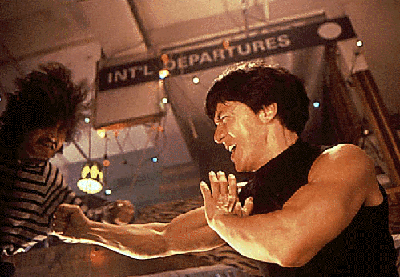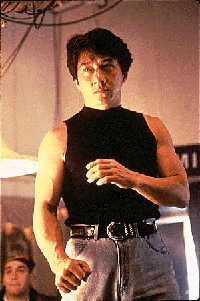Rumble in the Bronx 
No Bronx Cheers for the Amazing Chan
Jackie Chan, the biggest movie star in Asia, tries to conquer America again, but this time on his own terms.
With the great success of his new style of kung fu comedy meeting tremendous success, in 1980 he came to the US to star in The Big Brawl. He played a young roller-derby hopeful (?!) who gets mixed up with gangsters in 1930's Chicago, and is eventually forced to compete in a fighting contest. It's not a bad picture, but it could've been better. Hoping to recreate the success of Enter the Dragon, the producers hired director Robert Clouse, but Chan complains that Clouse failed to understand Jackie's style and ignored his input. The following year found Jackie guest starring as a Japanese racer in Hal Needham's sloppy chase picture Cannonball Run, but his talents were again mostly wasted.
In 1985, he decided to give an American production another try. In The Protector, director James Glickenhaus (Exterminator) was a bit more willing to let Jackie perform some unique stunt sequences, but they both seem hamstrung by budget and insurance constraints. Jackie's comedic talents are again wasted, as he has to play things straight in his New York cop role. Danny Aiello takes on the comedy relief as Chan's hilariously foul-mouthed partner. Again, American producers' failure to fully understand and utilize Jackie's appeal resulted in a lukewarm reception.
Not that this failure to bowl over English speaking audiences fazed Jackie all that much. In the meantime, he was churning out one huge hit after another for Hong Kong's Golden Harvest studio: Drunken Master, Project A, Police Story, Armor of God (all four of which have had at least one sequel), Dragons Forever, Wheels On Meals, and more, often with Jackie as director as well as star and stunt coordinator. As these wonderfully entertaining action movies began to show up in film festivals and midnight shows across America, a cult of Chan fans grew and grew. Taking note, New Line Cinema struck a deal with Chan to distribute three of his latest pictures, Rumble in the Bronx being the first to be released as part of this deal.
Here Chan plays Keung, a kung fu champ Hong Kong cop visiting New York City to attend his Uncle Bill's wedding. Uncle Bill (Bill Tung) is also selling his grocery store and retiring, but when the buyer turns out to be the pretty Elaine (movie and singing star Anita Mui, also in Chan's remake of Lady For A Day, Mr. Canton and Lady Rose), Keung agrees to help out at the store while Uncle Bill leaves on his honeymoon. Before too long it becomes apparent why Bill was so eager to sell and retire: his Bronx store is regularly victimized by a gang of biker thugs.
It doesn't take long for Keung to make himself the enemy of this gang. After a few running battles, they corner him in an alley and bombard him with glass bottles. Barely making it home, he collapses at the door of Danny, the crippled little boy next door he's befriended, where he's cared for by Danny's sexy sister Nancy (Francoise Yip). More conflict arises when he learns that Nancy is part of the gang. Eventually Keung defeats, then befriends the gang - at which point he and his friends are threatened by the much bigger menace of much more professional criminals.
Although you may laugh at the poor job Vancouver does in playing New York - watch for the mountains in the background - it's unlikely that this is very noticeable to millions of Chan fans outside the USA, so it's not really such a big deal. Dozens of Gotham-set movies are shot in Canada and elsewhere every year. Even Escape >From New York was made in St. Louis.
New Line Cinema cut 15 minutes of "cultural differences" from the version released in Asia last year, but some of this still plays awkwardly. Reflecting circumstances in Hong Kong, the street gang doesn't have many guns (apparently only one), and they're portrayed as a bunch of rowdy kids who "go too far sometimes". Keung often comes off as blatantly self-righteous - after he beats up the entire gang, he gives them a terse lecture, telling them they "are the scum of society!" This line is sure to draw howls of laughter, but it's not uncommon coming from an Asian movie hero. Doubtless, in reality the gang would have shot this troublemaker by this time - in America, the only answer for defeat seems to be retribution - but instead they are shamed and come to respect Keung.
The editing also serves to de-emphasize the romantic triangle between Keung, Elaine and Nancy, which is left hanging at the more abrupt end of the original cut. This makes for a neater, better flowing story, but at the expense of many of Anita Mui's scenes. Also, despite the fact that this has better Anglo actors than most Asian films, some of them are still painfully bad. between Keung, Elaine and Nancy, which is left hanging at the more abrupt end of the original cut. This makes for a neater, better flowing story, but at the expense of many of Anita Mui's scenes. Also, despite the fact that this has better Anglo actors than most Asian films, some of them are still painfully bad.
The soundtrack has also been redone and tweaked. The dubbing has been done as seamlessly as possible, with Chan and most of the cast reading their own lines. The new mix gives the sound effects a snap they didn't have before. There's also new theme music by J. Peter Robinson, and a catchy new tune by the Ramonesque Irish band Ash over the closing credits.
All this editing has left us with what really matters - Jackie in eye-popping action, and the guy literally gives 'til it hurts. No other star in cinema history has risked his neck so many times. Chan's movies are really in a class by themselves - even his lesser efforts (like this one) have 10 times the thrills of most other action films, especially if you keep in mind it's mostly done without special effects. Knowing this, even stunts that seem relatively simple are impressive. Reportedly, during the scene where Keung is bombarded with bottles, the crew ran out of fake bottles rather quickly. Rather than shut down production while more were made, Chan ordered shooting to continue using real bottles (one of which caught him full in the stomach). During another scene, we see a shot where Chan broke his ankle (if you're watching for it, you can grimace right along). He was back doing stunts the next day in a cast.
To emphasize this element of real danger, Chan always includes outtake footage run behind the closing credits, which New Line has wisely kept in. These clips are often amusing, but just as often frightening, or touching. We see Chan come close to death or serious injury many times, and we also see him sick with worry when others are injured.
Director Stanley Tong (Police Story 3: Supercop)was himself a top stuntman, until injuries forced his retirement. When developing a stunt or fight sequence, he often tries it out himself to get a better feel for it before shooting begins. As a result of this experience, combined with a fine visual instinct, are action sequences that easy to follow without any slackening of pace and rhythm.
With the coming reunification drawing near, many stars of the wildly creative Hong Kong cinema are seeking homes overseas. Jackie has been checking out his options, shooting his latest films in Canada, mainland China, Japan, and Australia. Although he would love to embrace all the opportunities available in America, he not really too worried about whether this last attempt at American stardom succeeds - after all, he still has millions of fans worldwide. But if the Chan phenomenon fails to catch on here, we'll be the one's who will suffer - I'd like nothing better than for all of his movies to be released here. Despite it's flawed and oddly complicated plot, Jackie Chan's work in Rumble in the Bronx is nothing short of amazing. It deserves your support because we all deserve more of Jackie Chan, and he deserves as much success as he can get.
Visit the Rumble in the Bronx home page.
Or check out one of many Jackie Chan home pages.
Front Page || Movie Madness
Copyright © 1994-1997 by Virtual Press/Global Internet Solutions. Internet Daily
News and its respective columns are trademarks of Virtual Press/Global Internet Solutions.
|
 Written by Brian Thomas
Written by Brian Thomas
 Written by Brian Thomas
Written by Brian Thomas
